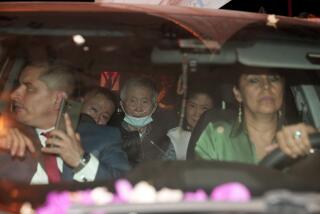Deadly Jail Clash Follows Crackdown on Peru Rebels
LIMA, Peru — Only hours after Peruvian President Alberto Fujimori used his near-autocratic powers to sign decrees that mete out harsh prison terms for captured rebels, police clashed with guerrilla inmates at a maximum-security jail Wednesday.
The incident left one prisoner and a policeman dead.
Police said at least 16 police officers and 11 rebels, all of them women, were injured in a fierce battle with guns and bombs inside the women’s cellblock at Canto Grande prison in Lima.
About 650 Sendero Luminoso (Shining Path) rebels, 250 of them women, are held there. Many are awaiting trial and have not been convicted.
The fighting, sparked when hundreds of police went to the prison to move some of the guerrillas to another jail, was still going Wednesday night. Bomb explosions and the staccato of automatic-weapons fire could be heard by reporters outside the prison.
Police at the facility said inmates tossed bombs and poured acid onto police from rooftops as they approached the women’s cellblock.
Sendero Luminoso is a Maoist group whose 12-year-old insurgency has taken more than 25,000 lives and cost Peru billions of dollars in economic damage.
Fujimori had said in a televised speech Tuesday night outlining his measures: “We want a country without violence and a climate of security and tranquillity, both for human life and for the nation’s socioeconomic development.”
Wednesday’s decrees, signed by Fujimori, include a mandatory, 20-year jail term for anyone convicted of any involvement with rebels and life imprisonment for their leaders.
Any person who “makes apologies for terrorism or for any person who has committed” guerrilla acts through the media would go to jail for a minimum of six years, one decree said.
Fujimori dissolved Congress, closed the courts and suspended Peru’s constitution with military backing April 5 in what he called an effort to strengthen his hand in the fight against the guerrillas and the drug trade.
The military has long sought tough, mandatory jail terms for rebels, but most such proposals have died in the 240-member Congress. With Congress dissolved, Fujimori was free to decree the new measures as he saw fit.
He announced the decrees only hours after he rebuffed proposals from an Organization of American States mission to speed up his yearlong timetable to return Peru to democracy.
The timing of the decrees suggested that Fujimori wanted to show the OAS mission that he did not intend to soften the near-dictatorial powers he had acquired.
Fujimori said the government will consider reinstating the death penalty for guerrillas who take part in “annihilation squads,” which Sendero Luminoso uses to kill its enemies. The death penalty was abolished in Peru in 1979.
More to Read
Sign up for Essential California
The most important California stories and recommendations in your inbox every morning.
You may occasionally receive promotional content from the Los Angeles Times.










